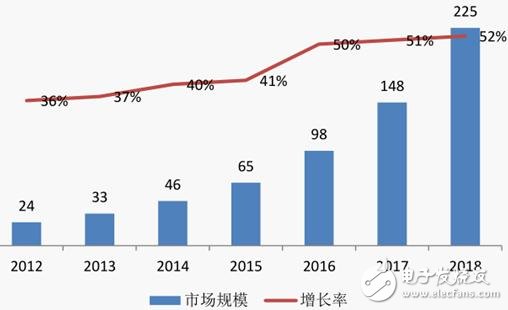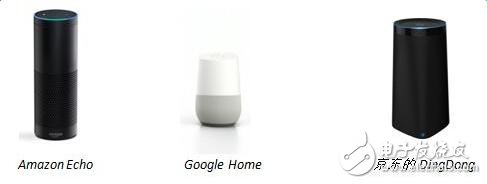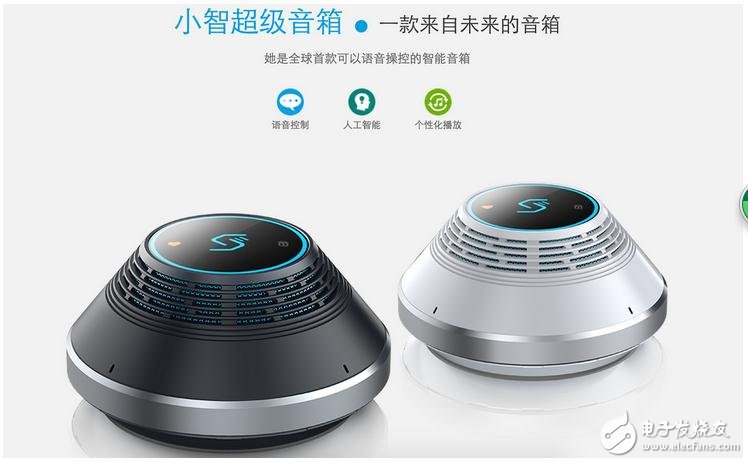"Wulinhao is outstanding for my generation, and I am reminded of the years of the rivers and lakes." After the ups and downs of the heroes, the real hero can laugh at the huge waves and roll up thousands of snow, or this time is the time when "it is hard to laugh and talk about yesterday".
The electronics industry is also the same, the industry is ups and downs, the enterprise is a few times life and death, and there are only a handful of manufacturers that really grow up. So what do you think about the smart home, smart speakers and voice control at this stage? Can voice recognition bring out the explosion of smart home?
Perhaps in the eyes of many people, the intelligence of the speaker may not be strong, but in the current electronic industry is everywhere innovation, everywhere in the background of smart, such as products without intelligent words, it seems a bit unspeakable, take Do not taste the taste. In addition to the intelligentization of products such as sockets and TVs in the home, users hope to have more traditional digital products, and manufacturers also hope to find breakthroughs with more intelligent products. Smart speakers are the products that both parties have found at the same time.
In addition to the connection control that people have already seen, the smart speaker should have the following features : Of course, the core of it is voice interaction.
1, interconnected, can be shared by multiple devices:
Smart speakers should be easily interconnected wirelessly with other smart devices, such as TVs, tablets, computers, etc. When people are at home, they may often need to switch between different devices. The speakers that can be shared by multiple devices are smart.
2, can be automatically adapted, multi-speaker interaction:
Different smart speakers should be able to interact with each other and be able to transfer music. For example, when people walk from the living room to the bedroom, music should be transferred to the bedroom. Smart speakers should be combined with sensors to recognize human actions.
3, cloud music library:
The smart speaker also needs to have a cloud music library. The cloud music library is not the app on the mobile phone to connect to a music library. Instead, the speaker itself can be connected to the cloud music library. The cloud music library means that it can be independent after the phone is set. In the search and playback function of the mobile phone, the speaker itself can be operated, and the operation of switching the song can also be performed without relying on the mobile phone.
4, voice interaction:
The positioning of the intelligent speaker is more in line with the voice interaction scene in the home. The reason why the speaker is "smart" is also because of the voice interaction. While providing ubiquitous music, smart speakers can also provide a ubiquitous voice control portal, giving the smart home more imagination.
5, with an open interface:
Smart speakers should become an important part of smart homes. Speakers can be placed anywhere in the home. Speakers can be connected to other smart devices in the home, and voice or touch can be used to control other smart devices through the speakers.
The entrance to the mobile Internet or Internet of Things era is based on a large user base. Smart speakers need to have a huge user base to control smart homes. Therefore, they can get support from partners through open interfaces, and then gain more user base advantages, which will make it easier for them to increase their intelligence. Home control.
Boost of voice interaction
Paliwal, Chairman and CEO of Harman Group, the world's leading provider of intelligent audio solutions, said in a speech at the September 2015 International Electronics Show in Berlin that the application of intelligent audio is unlimited. He believes that intelligent audio will bring The outbreak of the Internet of Things.
Smart speakers are a form of smart audio, and the potential in the Internet of Things such as smart homes is equally huge.
The Internet of Things is the next big market with more than $5 billion in business opportunities. By 2016, the use of connected devices will double to 600 million, and by 2018, the number of people using connected products will double.
The booming development of Internet of Things applications has brought about a new round of business opportunities. More and more manufacturers are starting to make great efforts to accelerate the development of various technology products to the card-based Internet of Things market.
According to estimates, the potential market for smart homes in China is about 5.8 trillion yuan, and the development space is huge. Among them, home appliances smart home products have the highest market share, accounting for more than 70% of the market. However, due to problems such as product price and utility, the overall growth rate of smart home appliances in home appliances is slow. On the other hand, small products such as smart lighting and home cameras are not only cheaper, but also able to meet the immediate needs of consumers, so the market is growing faster. It is estimated that the overall growth rate of China's smart home market in the next 3-5 years is about 13%, and the market has not yet arrived.
The scale of the global smart home market in 2012-2018 

China's smart home market scale in 2012-2018 

The global smart home market reached US$41 billion in 2014, and its growth rate has gradually slowed down. It is expected to maintain an annual growth rate of approximately US$8 billion. In 2018, the market size will reach US$71 billion. In 2014, China's smart home market reached US$4.6 billion. It is expected to show explosive growth in the next few years, with a growth rate of around 50%. In 2018, the market size will reach US$22.5 billion. China's smart home market has gradually become the focus of global smart home market growth, accounting for the proportion of global smart home is expected to increase from 11% in 2014 to 31% in 2018.
Smart home will combine the safety, entertainment, diet and health of the family. The user will no longer be a loose combination of various home appliances and mobile devices, but an organic whole. The speaker products in the voice interactive control products become the mainstream solution.
In November 2014, Amazon launched the smart speaker Echo, which supports Bluetooth and WiFi and can play music. At the same time, it also integrates voice functions, through the cloud services provided by Amazon, can search, news, shopping, reminders and other operations. In April of this year, Amazon announced that Echo supports Belkin WeMo smart switches and Philips Hue smart lighting. This means that it is not just a speaker. You can do a voice search to Echo, and you can use voice commands to let it control the switches and lights. Amazon's expectations for it are far less than this. In the future, Amazon will also add smart home compatibility to Echo, enabling it to operate other smart home devices. Since the launch of Echo in November 2014, its sales have been estimated to have reached 3 million, and sales have far exceeded expectations.
On the one hand, the outbreak of domestic smart speakers is influenced by Amazon Echo speakers. On the other hand, the positioning of speakers is more in line with the voice interaction scene in the home, which naturally leads to the promotion of voice manufacturers.
For example, Jingdong and Keda Xunfei jointly launched the smart speaker, Ali and Philips cooperated to launch the wireless speaker "Xiaofei", as well as Xiaozhi speakers, bird audio, 360-inch speakers and so on. Although the above products are different, but their purpose is only one, in line with the tide of artificial intelligence, to seize the smart home entrance.
Amazon Echo, Google Google Home, Jingdong å®å’š smart speaker: 

Xiaozhi smart speaker: 
Xiaobian conclusion:  Xiangzhuang dance sword, intended to Pei Gong
Xiangzhuang dance sword, intended to Pei Gong
The smart speaker market is still in its infancy and the competition is not intense. Many people in the circle feel that the smart speakers suddenly appear to be inexplicable. The speakers belong to the familiar products and are relatively easy to be intelligently transformed. They are also the blue ocean market. And it seems that the current definition of smart speakers is not too clear, but there is no doubt that it must belong to the smart home, belonging to the intelligent hardware of the mobile Internet and the Internet of Things, is a gimmick.
But if we go deep into the thoughts, we can find more. In a cyber language, it is "thinking and fearing". Why do you say this? Just like Baidu’s platform dominates traffic portals, the platform for controlling portals is absolutely competitive, or why cloud computing vendors, consumer electronics vendors, smart home enterprises, Internet of Things companies, and smart hardware companies are all mad. The reason for the speaker is, "Zhuangzhuang dance sword, intended to Pei Gong" They simply do not want to make a few small money by smart speakers, but to occupy the entrance to make big money!
Can voice recognition bring out the explosion of smart home?
First of all, we know that smart homes can be called intelligent without adding an APP. Do you have to figure out the highlights of smart homes and where you just need them? Grasping these two points is the time when the industry breaks out, people are lazy, so technology will improve, people can learn to be lazy and can do things well, and voice interaction can simplify the control of smart home to the greatest extent, realize humanity. A smart, intelligent home experience is an important development direction for the future.
Secondly, we found that even if the current speech recognition is not in place, the application of voice control in smart speakers is indeed quite primitive, but it will give us more enlightenment, although the "smart" of some smart speakers on the market is still very preliminary. The voice interaction of the speaker is not too ideal, but the voice control will be a breakthrough for the smart speaker, because only the smart speaker with voice control can be more independent of the independent operation of the mobile phone, and only the smart speaker does not depend on the mobile phone. Can really be called a smart speaker. While providing ubiquitous music, smart speakers can also provide a ubiquitous voice control portal, giving the smart home more imagination.
Baby Food Processor,Mini Food Chopper,Commercial Food Processor,Manual Food Processor
JIANGMEN JIANGHAI DISTRICT SHENGHUI ELECTRIC CO.,LTD , https://www.shenghuielectric.com